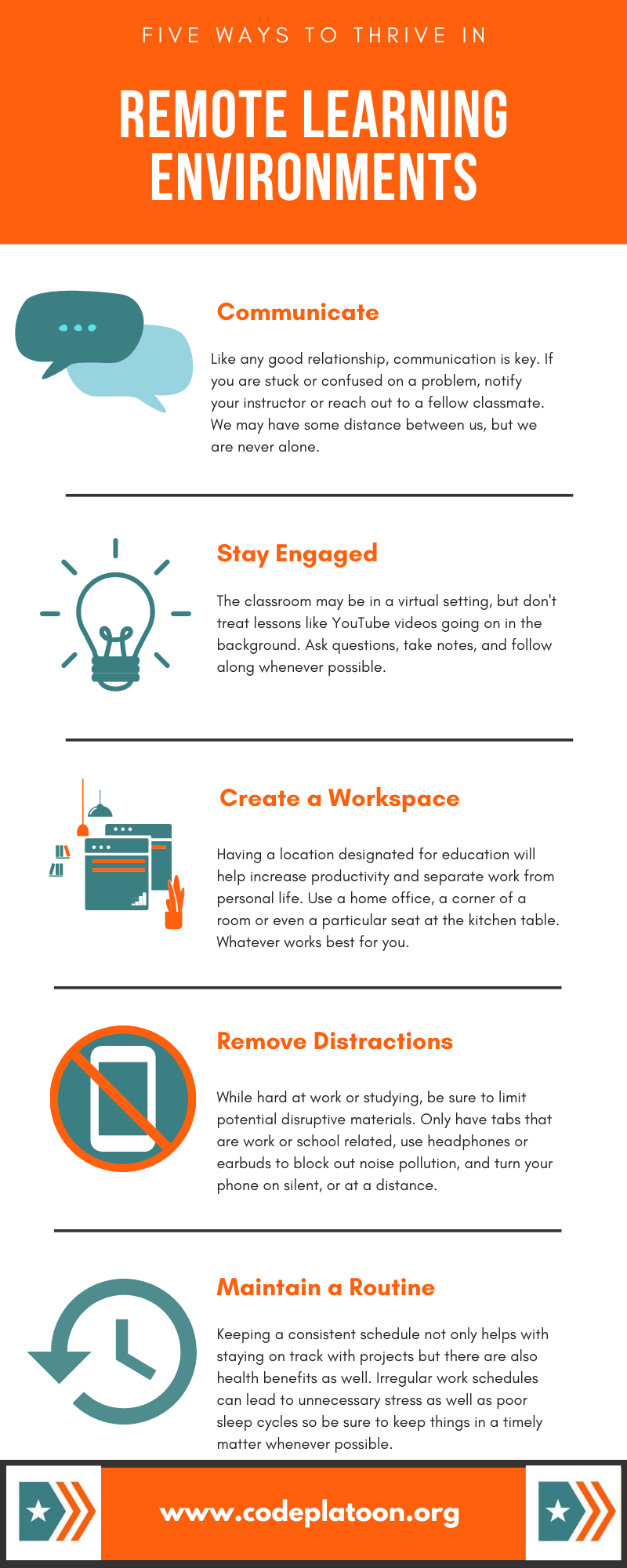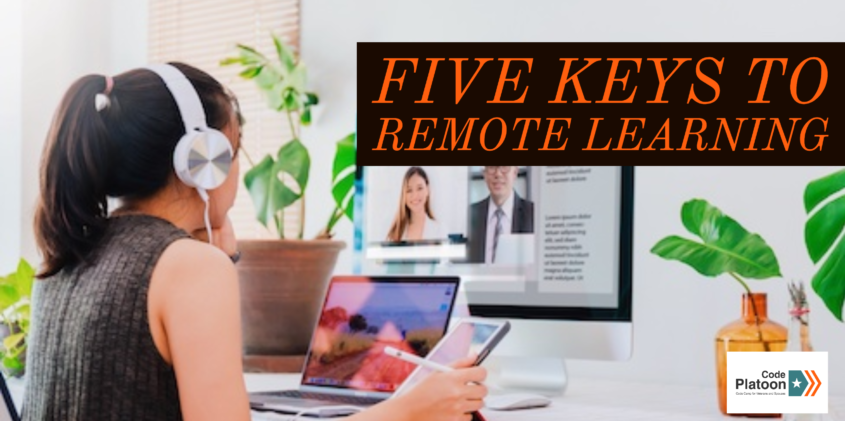How to Learn in a Remote Environment
In the age of social distancing, remote learning and working may not be ideal for everyone. However, it is the current reality as many employers and schools are opting for prolonged periods of remote platforms. To gather best practices for working and learning remotely, we reached out to Code Platoon’s first Remote Coding Bootcamp graduate, Leanna Keene. An Air Force linguist Veteran, Leanna graduated with Echo Platoon in 2018 and has had experience working from a distance with her peers, military and civilian side. Here are five tips to thriving in remote working environments.
Communication is Key
“In the military, a lot of my co-workers were on the other side of the world,” says Leanna, “the only means of communication I had with them was via a chat tool.” She advises Code Platoon students to reach out to peers and instructors as much as possible. Through the video classrooms, chat features, and utilizing other resources such as screen sharing capabilities to more effectively demonstrate challenges or successes within the program. “You can still make those personal connections with your classmates, even from a distance, and I think that was important for me.”
Stay Engaged
“You just have to use your voice and still be engaged,” says Leanna, noting that while instruction through a video format feels akin watching a Youtube video, students should participate as though they were within an actual classroom. Ask questions, follow along when possible, or whatever regular habits that enforce focusing on the lesson on hand. “Do those little things so that you don’t disconnect. For example, note-taking was huge for me.”
Create a Workspace
Leanna recommends having an actual space dedicated to course work. Now this space will look different for each person depending on the living situation, but it is still possible to reserve a ‘work only’ spot. It could be an entire room, a desk, or even a specific corner of the dining room table. Whatever that space looks like, the only thing that should be occurring there is course work, and when the workday is over, or a break is needed, step away rather than decompressing in that assigned location. “You need to remove yourself from your workspace and go somewhere else,” says Leanna. “Because the second you start combining those two, you lose focus.” Here are a few simple tips to follow with said space and two things to avoid.
Remove Distractions
Avoiding distractions is undoubtedly the hardest part of working from home, hence creating a designated work environment. Still, more dedication may be needed to ensure complete focus on the necessary tasks on hand. “Don’t have tabs open that aren’t Code Platoon related,” Leanna says for the computer or laptop, but it may be best to keep them out of sight when it comes to mobile devices or at least out of reach. “Even before all the craziness happened with COVID, I would catch myself all the time. If I don’t turn my phone on silent or don’t have it sitting farther than an arm’s reach all of a sudden, my hands aren’t on my keyboard anymore.” Smartphones and applications are designed to be addicting, so to save precious time, it may be best to keep your phone off or away while you are coding.
Maintain a Routine
“If you don’t carve out the time, it’s too easy to find other things to fill that time with,” says Leanna. Time is our most valuable and limited resource, so it is imperative to keep a regular schedule. Establishing a work schedule is a gateway to success, and a simple morning routine can help set the standard for a productive day. Code Platoon has a full plan built into the program, and it would be wise not to deviate from it. Our students can expect 10 to 14 hours of coding a day each week. The payoff is that after 15 weeks, Code Platoon graduates are well equipped to write code. With the workforce adapting to the changes brought on by the coronavirus, Code Platoon programmers can potentially work anywhere.
Amanda Michelle Gordon is one of Code Platoon’s summer interns, serving in the Content and Marketing department. She is a U.S. Air Force Veteran and a student of SUNY New Paltz for Journalism and Sociology. In her free time, Amanda enjoys reading, the outdoors, and turning coffee into copy. You can find Amanda on LinkedIn and Twitter.

